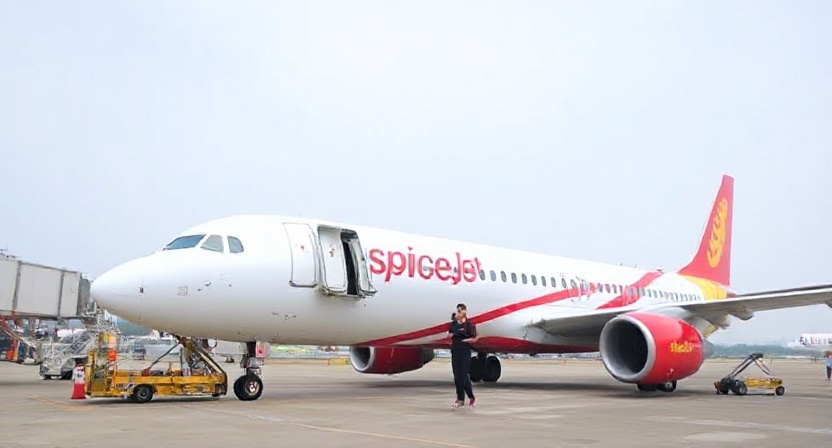Published on
August 27, 2025

SpiceJet, the low-cost carrier of India, launched a paperless boarding procedure at Shillong Airport, paving the way towards a better passenger experience and making air travel greener. The innovation facilitates the delivery of boarding passes digitally through WhatsApp at the time of check-in, making paper printouts unnecessary. The initiative follows SpiceJet’s vision of providing smoother, cleaner, and quicker flying experiences to travelers.
SpiceJet Rolls Out Paperless Boarding at Shillong Airport for a Seamless, Eco-Friendly Travel Experience
The airline highlighted that despite the growing use of web check-in and digital initiatives like Digi Yatra, over 9 million boarding passes were still printed at Indian airports in June 2025 alone. This resulted in the production of around 6 tonnes of carbon emissions, contributing to environmental pollution. The introduction of WhatsApp-based boarding passes is SpiceJet’s latest effort to promote eco-conscious travel, reduce paper usage, and enhance operational efficiency at airports.
A Shift Towards Sustainable Air Travel with Digital Innovation
The introduction of WhatsApp boarding passes at Shillong Airport is part of SpiceJet’s broader commitment to sustainability and digital innovation. The Web Departure Control System (WEBDCS)—a browser-based platform—allows check-in staff to issue digital boarding passes via WhatsApp or email, and baggage tags through SMS, all from a tablet or the standard airport check-in computer.
This digital transition not only streamlines the check-in process but also makes it more efficient, reducing wait times at the airport counters. Passengers can now easily access their boarding passes on their phones, ensuring that the process remains fast and eco-friendly.
SpiceJet’s Use of Digital Innovation to Streamline Check-In Process
The Web Departure Control System (WEBDCS), a browser-based platform, enables SpiceJet’s staff to issue digital boarding passes via WhatsApp or email and send baggage tags through SMS, using either tablets or standard check-in computers. This digital innovation streamlines the check-in process by making it faster and more convenient, reducing wait times for travelers at the airport.
Not only does this improve the guest experience, but it also enhances operational efficiency, allowing for smoother management of airport logistics and flight operations. SpiceJet aims to extend this paperless boarding system to more airports across India, ensuring more passengers benefit from this sustainable and technologically advanced service.
SpiceJet Expands Its Presence in India’s Domestic Aviation Market
SpiceJet is strengthening its position as a major player in India’s domestic aviation sector. The airline’s competitive pricing strategy, combined with its growing route network, has allowed it to capture an increasing share of the market. With more affordable travel options and expanding flight routes, SpiceJet is attracting more passengers and solidifying its role as a key airline in India’s fast-growing travel industry.
Strategic Fleet Expansion and Improved Services Drive SpiceJet’s Growth
As SpiceJet continues to expand its fleet and enhance its services, it is becoming one of the fastest-growing airlines in India. By focusing on enhanced customer service, modern aircraft, and improved efficiency, the airline has seen a rise in both domestic passengers and regional connectivity. This has resulted in a steady increase in SpiceJet’s market share, allowing it to serve both budget-conscious and business travelers.
Sustainability and Technological Innovation: Key Factors in SpiceJet’s Growth
SpiceJet’s commitment to sustainability and technological innovation is propelling its growth in the domestic aviation market. By adopting eco-friendly practices such as paperless boarding and integrating advanced digital tools, SpiceJet is not only attracting green-conscious travelers but also improving operational efficiency. This focus on innovation and sustainable travel is allowing SpiceJet to stay ahead of the competition, boosting its growth in India’s aviation industry.
Future Impact on India’s Aviation Sector and Tourism Industry
This move towards paperless travel is expected to have a long-term impact on India’s aviation industry, especially in terms of sustainability. By reducing the number of printed boarding passes, SpiceJet is contributing to eco-friendly tourism, which is becoming an increasingly important factor for travelers. With global travel trends shifting towards sustainable practices, this initiative positions SpiceJet as a leader in sustainable aviation in India, encouraging more eco-conscious travel choices.
Moreover, by offering a faster, more efficient check-in process, the airline enhances the overall travel experience, making air travel more accessible and appealing to a growing segment of Indian and international tourists who value convenience and sustainability. As tourism in India continues to rise, especially post-pandemic, SpiceJet’s commitment to digital innovation will likely become a major differentiator in the competitive aviation market.
SpiceJet Leading the Way in Sustainable and Digital Travel Solutions
SpiceJet with their introduction of paperless boarding at Shillong Airport is a major step in aviation sustainability and digital travel innovation. With passengers evermore looking for green and efficient travel options, this project not only improves the passenger experience but also aids India’s tourism industry in embracing global trends towards sustainability. With an ambition to roll out paperless boarding nationwide, SpiceJet is leading the way in air travel and tourism in the country.







